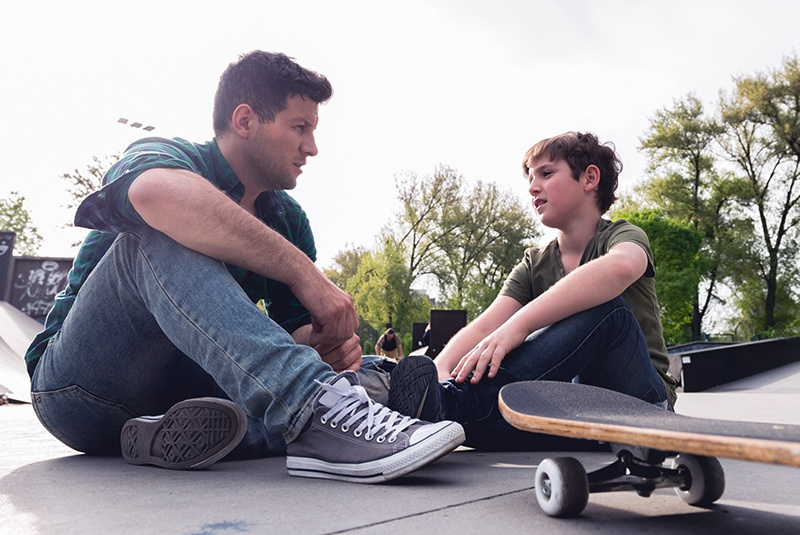Parents can help end bullying by always being open to conversation

You just saw your teen get pushed at the bus stop. Or maybe you suspect that bullying is behind your young child’s sudden reluctance to go to school or an extracurricular activity.
What you should do next isn’t always an easy decision. No two cases of bullying are ever alike, and there are usually nuances to consider. But the foundation for an honest conversation with your child could be in place if you already follow some guiding principles of parenting. According to two Boston Children’s Hospital psychologists, a consistent parenting style that balances nurturing, open dialogue, and boundaries allows you and your child to resolve the problem together — while giving you room to intervene.
“It all starts with parents providing a positive family atmosphere: providing safety; offering praise, nourishment, and warmth; communicating clear expectations regarding behavior; and setting developmentally appropriate limits,” says child psychologist Marcus Cherry. Children who feel comfortable having conversations with their parents feel supported by them, he says. “They have clear expectations about their behavior and can begin to learn and develop interpersonal skills, like how to talk about and label emotions, and problem-solve — all of which are needed to navigate the multiverse of peer relationships.”
Consider following a ‘middle ground’ of parenting
Cherry and other psychologists recommend an authoritative approach to parenting — the halfway point between an authoritarian style that might discourage children from expressing their thoughts and a permissive style that might lead children to believe parents should have no say in a solution to bullying. Authoritarian parents typically punish their children for not following rules and expectations and offer less warmth and nurturing than permissive parents, who, in turn, set few rules or standards of behavior and might let their young children stay up late playing video games.
The middle ground of authoritative parenting should give your child the encouragement they need to develop emotionally and better handle bullying, Cherry says. It lets them understand that a parent’s support is coupled with an adult’s responsibility to step in if needed. Also, the approach helps remind parents to not overlook their child’s feedback.
“Your first reaction might be to spring into action” and reach out to teachers or even confront the bully yourself, says child psychologist Keneisha Sinclair-McBride. But unless your child’s safety is in immediate danger, you should resist that strong instinct to quickly intervene. “Instead, take a moment to listen. Say you’re sorry that happened and ask what you can do. Sometimes, kids just need to be heard, and they often want to problem-solve themselves.”
The nuances of bullying call for different actions
Of course, your child won’t always want to talk about the difficulties they’re facing. “Little kids tell their parents everything, but they pick and choose what to say as they get older,” Cherry says.
A sure sign that something is amiss is when your child becomes clingy or irritable, or doesn’t want to participate in activities or attend school at all. If your child isn’t forthcoming about the cause of this sudden behavior change, Cherry advises asking if something in life has become troubling or, more directly, if someone is bothering them. If that doesn’t work, consider contacting a teacher or school official to see if they’ve noticed anything.
No matter how you learn about your child being bullied, you’ll eventually have to talk to them. Your advice, Sinclair-McBride says, will depend on the circumstances; some instances might not be bullying at all. If your 6-year-old says someone made fun of their shirt, for example, you can tell your child to politely speak up for themselves or ignore the other child. But if incidents that trouble your child worsen, school staff should get involved. “You can tell your child, ‘Not everyone is going to like you. Not everyone has to play with you. But you do have the right to be treated with respect.’”
If bullying gets physical, resist telling your child to fight back. “If we encourage that, now everyone is fighting and things could get even worse,” Sinclair-McBride says. “Violence only perpetuates itself.” Instead, an honest dialogue with your child should prompt them to share their feelings and allow you to ask how they want to handle the bullying. You can agree to not contact their school right away if safety isn’t an issue, she says, but if it is, you should explain that despite the risk of them being embarrassed, it’s your responsibility to get other adults involved to keep them safe.
The day-to-day work of parenting sets a tone
The groundwork for that conversation, Sinclair-McBride says, is laid in everyday parenting, especially when following an authoritative approach that balances limits and expectations with encouragement and support.
“The hardest thing about not setting limits is when all of a sudden you need to,” Cherry says. “On the other hand, you don’t want to say ‘no’ to everything. You want flexibility with consistency, a core of warmth, nurturing, and communication. That ultimately fosters problem-solving for bullying. It allows your children to feel comfortable communicating more to you about what’s going on.”
Learn more about the services available to you and your child at the Department of Psychiatry and Behavioral Sciences.
Related Posts :
-

When your child is the bully: Tips for parents
It’s bad for children’s health, makes headlines, and defies most attempts to prevent it. Bullying has become the “...
-

Dealing with peer pressure: How to empower your teen
With every coming of age almost inevitably comes changing friendships, relationships, and social pressures. But gone are the days when ...
-

Cyberbullying in the age of COVID-19: How to protect your kids
Now that so many classrooms across the country have moved totally or partially online, kids of all ages are spending ...
-

Samantha's story: 'I was bullied by a classmate'
During the fifth grade when Samantha was 10 years old, she was bullied by a male classmate. She remembers walking ...





